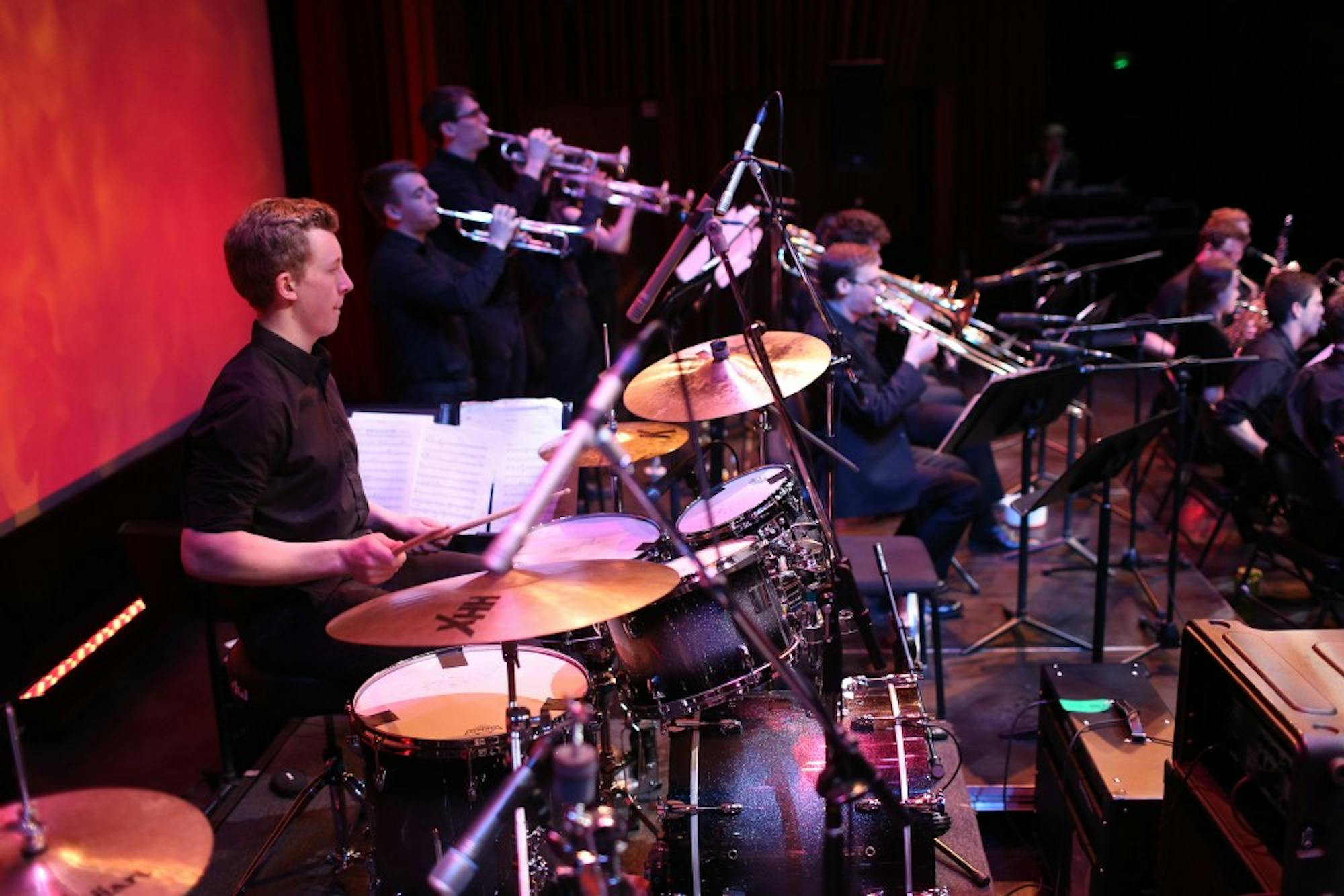The Barbary Coast Jazz Ensemble’s winter concert will be Saturday, Feb. 24at 8 p.m. in Spaulding Auditorium at the Hopkins Center of the Arts. Director Taylor Ho Bynum invites eight jazz leaders to play alongside the student musicians: Ken Filiano (acoustic bass), Tomas Fujiwara (drums), Mary Halvorson (guitar), Jim Hobbs (alto and soprano saxophone), Ingrid Laubrock (tenor saxophone), Bill Lowe (trombone and tuba), Tomeka Reid (cello), and Stomu Takeishi (electric bass guitar). The concert will feature an array of contemporary music, including Bynum’s own compositions.
Bynum wanted to bridge the gap between Dartmouth and his own creative community.
“It was a real priority for me to bring in artists to Dartmouth,” Bynum said. “The idea of community is very important to all creative practices but especially to this kind of music. For me, I wanted to make the point to connect my creative community with the students and community that I’m working with at Dartmouth. Both because I think these musicians are extraordinary and incredibly talented and critically acclaimed but they are also wonderful people. One of the joys is that you get to work with the people you love.”
For Bynum, inviting his mentors to play with Barbary Coast brought things full circle.
“The trombone player who is playing with the band, [Lowe], I met when I was 16, and he was a teacher of mine,” Bynum said. “And now he’s giving me the gift of playing in my band, and I’ve realized all of a sudden that I’m the age he was when I met him. So for me, it’s about continuing the legacy of the mentors that I had and introducing the students to those mentors while trying to be a teacher and a mentor myself. It’s very important to me creating that through line, and I really think that’s what this music is about.”
In addition to playing alongside the jazz ensemble on Saturday, the eight guest artists will also host workshops to teach students new techniques on their instruments. Noah Campbell ’21, who plays tenor saxophone and clarinet, joined Barbary Coast this past fall. Campbell was looking forward to attending Hobbs’ workshop and learning from the experience.
“This weekend, I was listening to one of his albums to try and find what I could gain from him going into the lesson,” Campbell said. “And what I really admired was his sound and tone projection, because no matter what he was playing he could make his saxophone sound in all these different colors and tampers and I was like, ‘Wow I want to do that!’”
Campbell said his membership in the Barbary Coast has exposed him to great musical talent.
“I never thought that there would be so much musical knowledge in one space at one time coming in and out of Dartmouth,” Campbell said. “I want to take full advantage of all the opportunities.”
In his free time, Campbell composes his own music. Playing Bynum’s original compositions has served as a source of inspiration for developing his own writing skills.
“In my spare time I’d write these little weird patterns and cycles of things that I would do, like a melody that’s in 10 [beats] over a rhythm that’s in six.” Campbell said. “When I met [Bynum] and we started playing his compositions, I saw a lot of similarities to what I was trying to do in my own writing and I was like “Oh! I’m not too far off from what he’s doing, and it’s really helped me guide my own writing.”
Daniel Seo Tu’18 plays the baritone saxophone with Barbary Coast. Seo said Bynum’s improvisational directing style transformed the way he thought about jazz music.
“[Bynum has] given me a totally new perspective on how to improvise and how to think about not just jazz but music in general,” Seo said. “Sometimes he brings in this improvisational conducting style in which he sets up different cues and just calls them in the moment ... I’ve never played that way before, so it’s given me this whole new perspective. Usually, when I’d improvise the tempo and the structure would still be there. But the way [Bynum] does it just completely removes all those boundaries.”
The environment during rehearsal encourages and challenges students to experiment with the music, Seo said.
“[Bynum] encourages every single one of us to explore,” Seo said. “He brings us outside of our comfort zones and a sense of adventure into music.”
A common influence over the pieces in the concert is literature. Lowe’s “Evening Song” drew inspiration from Harlem Renaissance author Jean Tommer’s 1923 novel “Cane,”a collection of vignettes that portrays the experience of African Americans in the deep south. Hobbs’ “Aware of Vacuity” captures the trickster spirit of the Monkey King from Wu Cheng’en’s 16th century Chinese novel “Journey to the West.” Bynum’s “Wolves and Blizzards” was inspired by the thematic and structural elements of British author David Mitchell’s novel “Cloud Atlas.” Bynum’s original piece “Real/Unreal,” which will be premiering at this concert, was inspired by the science fiction writer Ursula Le Guin.
“I just really loved [Le Guin’s] creativity in imagining other worlds and presenting complex ideas and questions in a very poetic and beautiful way without necessarily having to provide the answers.” Bynum said. “For me, that’s a driving role in art in general and what I try to do in my work as a composer. It doesn’t have to be settled whether it’s composed or improvised, finished or not, which musician does it feature, is it solo or ensemble based. All of those questions should be posed and not answered which is what I find exciting about the musical process.”
The final piece in the concert is another Bynum original entitled “Sleeping Giant,” which was inspired by the possibilities presented by a path of hiking trails. For this finale, the Barbary Coast ensemble will play with Bynum and the eight guest artists for an improvisational performance of the piece.




